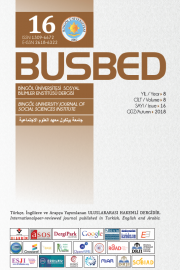MICHEL FOUCAULT’DA EPİSTEME VE SÜREKSİZLİK KAVRAMLARININ İNCELENMESİ
ANALYSING THE CONCEPTS OF EPISTEME AND DISCONTINUITY IN MICHEL FOUCAULT
Author(s): Göksel YıkmışSubject(s): Epistemology, Contemporary Philosophy
Published by: Bingöl Üniversitesi Sosyal Bilimler Enstitüsü
Keywords: Michel Foucault; episteme; discontinuity; archaeological analysis; knowledge;
Summary/Abstract: In this work, concepts of “episteme” and “discontinuity”, which have an important place in the terminology of Foucault, were studied in the framework of Foucault’s philosophy. With the consideration of the concept of episteme in this direction; Foucault’s insights into why archaeological settlements of historical periods have different knowledge bases in each era will provide insight. In addition to this, from the concept of discontinuity, the views and reasons why Foucault sees the necessity of separating the history, such as the Renaissance Period, the Classical Period and the Modern Period, will be examined. As seen in this context, the concept of episteme and discontinuity in terms of the idea that Foucault puts forth is a structure which needs to be considered together in terms of understanding rather than concepts which can be examined and understood by separating them from each other.
Journal: Bingöl Üniversitesi Sosyal Bilimler Enstitüsü Dergisi (BUSBED)
- Issue Year: 8/2018
- Issue No: 16
- Page Range: 625-636
- Page Count: 12
- Language: Turkish

